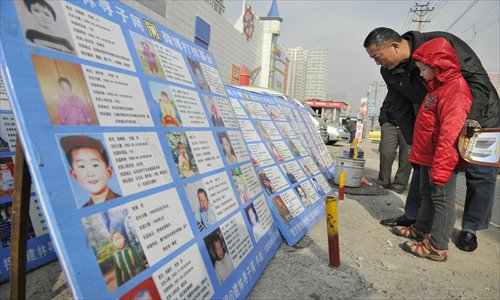China’s stolen kids

Since July, Xiao Chaohua, 37, has been driving a minivan covered with pictures of kidnapped children through a dozen of regions in China, accompanied by several other parents. When they stop, they hand out posters of over 200 missing children.
Xiao lost his 5-year-old son when his 10-year-old daughter took the boy to a nearby grocery store in Huizhou, Guangdong Province, in February 2007. His daughter came back alone, just three days before China's traditional Spring Festival.
Xiao sold his clothes store and over the following five years devoted everything to finding his son. In the course of his journey, he rallied other parents with missing children.
He told the Global Times that on their way though the country, they had saved seven other kidnapped children, but found no trace of where his now 10-year-old son lives. "I will keep looking until I find him. I just want to know how he is doing," he said.
A study by prominent blogger and documentary producer Charlie Custer, who was based in Beijing but now resides in the US, showed that while the Chinese government reports that fewer than 10,000 children are kidnapped each year, the US State Department places the number closer to 20,000, some independent estimates put the number as high as 70,000.
Lost forever
Kidnapped children are mostly sold to families wanting children, while some are sold into slave-like working conditions in brick kilns or become beggars. Some are even sold into adoption overseas, though this has become rarer in recent years.
Even when these children are freed, they aren't always returned to their parents.
A Legal Weekly report cited data from the Ministry of Civil Affairs published last year showing that among the 13,000 children saved during crackdowns on kidnapping in 2010 and 2011, only 900 were returned to their parents immediately.
More than 93 percent were initially left homeless, though later some of them were reunited with their families.
A document issued by the Ministry of Public Security (MPS) in 2000 stipulated that children who were not claimed by their parents should be handed to civil affairs departments for placement.
But if the purchasers had neither abused the children they had bought nor obstructed efforts to rescue them, they could adopt the children with their biological parents' consent.
Parents of missing children and law experts questioned this, saying it ensures there will be a market. The MPS ordered in 2011 that all rescued children should be sent to orphanages for temporary placement.
Because there's a chance that their parents may claim them, these children can't be adopted. All they can do is wait.
Reluctant to help
Xiao spoke with police immediately after his son went missing, but after a perfunctory search near an industrial zone, he was told his son must have been taken out of the province and would not be found.
He registered with the station, but no more help followed. He said when he asked police to check information about his son, they were reluctant.
"I don't expect anything from them and I just want to count on myself and other parents to find our kids," he said.
Xiao's skepticism was echoed by He Zhisheng, another heart-broken father from Jiangxi Province, who lost his 7-year-old son in January 2009.
When He's son disappeared while playing with a neighbor, he called the police immediately, but they didn't show up until three days later.
During this time, He and his family sent out flyers and searched the neighborhood. They even put an advertisement on local TV. Nothing worked. Later, he joined Xiao's group.
In contrast, a police source in Sichuan Province told the Global Times that despite limited resources, the police would always investigate when clues were provided.
In rare cases, local government employees have been complicit in kidnappings. The Beijing-based magazine Caixin Century reported in 2011 that prior to 2005, family planning officials in Gaoping and Longhui counties in Hunan Province had taken at least 16 children, because their parents were accused of violating the one-child policy.
They were sold to local orphanages at 1,000 yuan ($160.4) per child and some were adopted by overseas families with commissions of $3,000 paid to the orphanages.
Taking action
In 2009 the MPS built a national database containing DNA information from homeless children and parents with missing kids, but not all these parents were made aware of it and many haven't provided blood samples.
Custer told the Global Times in an email that China has excellent national anti-kidnapping task forces, but things break down at the local level.
"Local governments need to take kidnapping more seriously," he said, adding that many kidnappings could have been solved earlier if local police had put more effort into moving quickly and thoroughly. He also suggested officials need to do more to publicize the national DNA database and ensure local police follow the rules.
His points were echoed by Zhou Xiaozheng, a sociology professor with the Renmin University of China, who believes that children are kidnapped mainly because local officials don't fully perform their duties.
"The governments should improve their governing capacity. In the meantime, officials in regions where children are often kidnapped must be held accountable," Zhou said.
Like Xiao, others are taking action. Zhang Baoyan quit her job as a store manager in Jilin Province to run a website with her husband called "Baobei Huijia," or "Baby Back Home," where parents of missing children upload photos and details, and so can children trying to find their parents.
Since the site was opened in 2007, it has helped 555 people. It is now assisted by tens of thousands of volunteers who monitor entries and give advice, but it isn't enough.
"We hope that the entire society, particularly businesses, will join our movement to help get parents and their children back together," Zhang said, saying that products like soft drinks, toys and food have wide exposure and could help spread pictures of missing children among the public.